
by John P. Pratt
10 Nov 2019, 1 Arise (Priest).
©2019 by John P. Pratt. All rights Reserved.
|
1. Pagan Traditions 2. Halloween 3. Christmas 4. Easter 5. Conclusion Notes |
This article considers three very popular holidays ("holy days") in the United States: Halloween, Christmas and Easter. It is a response to those who teach that Christians should not celebrate them because they have Pagan roots. Even though all three include Pagan traditions, they differ considerably. Halloween is a day openly focused on witches and ghosts, with no attempt made to be holy, even though it was called "All Hallows' Eve". It not only has Pagan roots, it is essentially a completely Pagan holiday. Christmas is half Christian and half Pagan: nearly all of the fun decorations are Pagan, but the day is named for Christ and to Christians it is all about the birth of the Savior. And finally, Easter is almost entirely Christian, celebrating the day of the Resurrection, with only its name and the Easter Bunny having been adopted from Pagans. Easter Sunday is not celebrated at all by Pagans! Thus, the three holidays are very different from each other and should not all be treated the same.
 |
A comment about names is important. Many names of groups are loaded with baggage where the word connotes much more than it denotes. This article unavoidably uses the word Pagan, which often conjures up images of primitive painted natives dancing around a bonfire. Dictionaries give various definitions of Pagan including (1) non-Christian (2) non-Jehovah worship, and (3) non-major-world-religion worship. As has been mentioned in an earlier article[1], there are 25 main commandments in the Sermon on the Mount. Only the first and the last have anything to do with Jesus Christ; the rest speak of being a decent, loving person. One Pagan friend of mine is an excellent example of keeping the other 23 commandments! He will likely get to paradise before the Christian who says long prayers and comes home to beat his wife!
Thus, the word "Pagan" includes noble people who live good lives, treating others as they would like to be treated. The same is not true of certain subgroups of Pagans who do have evil intent. In this article they are referred to as knowingly practicing demon worship or Satanism. Their rituals often require breaking God's commandments.
This article discusses those three holidays, including some things the Lord has said about the subject. Some of the Pagan roots of each of those holidays are discussed in the following sections. The first section summarizes the main perspective of the article before those three sections. That may be the most important to read, so it was placed first. It was felt that many readers did not even want to know about the evil origins of holiday traditions because it could spoil all of the fun! And that might well be the correct attitude if those roots are indeed irrelevant. Even though some of the roots in demon worship are horrific, every attempt has been made to keep this article rated only PG-13!
How does the Lord feel about His people celebrating questionable holidays in order to "blend in" with the culture around them, or just because they are fun? If sin is involved, does His mercy cover them, especially if they are ignorant of what they are doing? The Lord has spoken on that very subject, in both the Old and New Testaments. Let's consider what He has commanded His people in the past.
At the time of the Exodus from Egypt, the Lord's covenant people (Israelites) faced two challenges, and the Lord addressed both in order to make His position perfectly clear. First, they had been in bondage in Egypt for centuries and as slaves were greatly influenced by Egyptian Pagan religion and traditions. Such habits could be partly purged out of the youth by spending forty years in the wilderness, following His new laws and holy festivals in a prescribed manner. But then another problem would arise. They would then enter the Promised Land of Canaan filled with the idolatrous Canaanites, so it would be important not to be contaminated by their demonic practices.
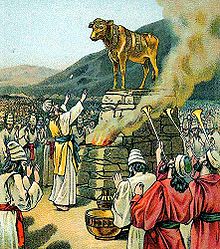 |
After the doings of the land of Egypt, wherein ye dwelt, shall ye not do: and after the doings of the land of Canaan, whither I bring you, shall ye not do: neither shall ye walk in their ordinances.
Take heed to thyself that thou be not snared by following them, after that they be destroyed from before thee; and that thou inquire not after their gods, saying, How did these nations serve their gods? even so will I do likewise. Thou shalt not do so unto the Lord thy God: for every abomination to the Lord, which he hateth, have they done unto their gods; for even their sons and their daughters they have burnt in the fire to their gods. -- Lev. 18:3, Deut. 12:30-31
In the New Testament, St. Paul writes:
This I say therefore, and testify in the Lord, that ye henceforth walk not as other Gentiles walk, in the vanity of their mind, Having the understanding darkened, being alienated from the life of God through the ignorance that is in them, because of the blindness of their heart -- Eph. 4:17-18
As I prepared this article, it was noticed that some pastors interpreted those scriptures to mean for us not to follow any pagan customs in celebrating Halloween, Christmas, and Easter. Before accepting their interpretation, notice that there is a huge difference between those days and our days. When Israel entered Canaan, they ignored this commandment and indeed began to follow the local customs of demon worship, such as sacrificing their infants to the blood-demanding idols. Was not that the real problem? They adopted idol worship along with the parties! That had been explicitly forbidden by the second commandment and murder is forbidden by the sixth! Thus, it appears that the commandment not to adopt local customs was really more about not adopting their religion. The feasts were an enticement to join in the fun, but resulted in forgetting the commandments! Knowing their propensity to sin, the Lord forbade the Israelites to join in any of the local "doings" at all. In fact, he had the Canaanite cities destroyed to avoid the problem.
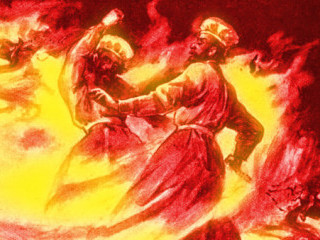 |
So what about our day, when most Christians know very little about the Pagan origins of many of their favorite holiday traditions? Christmas is a time of love and meaningful family traditions involving decorating a Christmas tree. The Church Fathers, who did not know the true birth date of the Savior, chose a Pagan holiday (December 25th) on which Christians could also celebrate the birth of their Savior. Was their hope to help merge the two cultures, convert some Pagans, and hope that someday the Pagan religion would totally be overcome by Christianity as it spread through the Roman Empire? If that was their hope, then they were successful indeed! That is, most Christians know only that Christmas traditions are quaint remembrances of fun Celtic parties, which are delightful to continue.
After the research that went into this article, here is a proposed list of questions to help decide just how much, if at all, one may wish to participate in celebrating holiday customs. It is mostly designed to get us thinking about what we are doing!
In summary, it would seem that the intent of one's heart is very important in how God judges our actions. On the other hand, He might not be too thrilled with us if we never question just why we are mindlessly following the traditions of our culture. Hence, questions were proposed to help get the mental wheels of reason turning! The answers to those questions might be very different for various readers, but the idea was to at least consider the questions.
 |
Why are we celebrating Halloween at all? In fact, it is a high holy day for Pagans, witches, and Satanists called Samhain (pronounced "sow-in", where sow rhymes with "how"). Why would Christians enjoy dressing their children up as vampires or devils?
Halloween has become the second most celebrated holiday in the United States. Thanksgiving still gets a family turkey dinner, but it is almost crowded out entirely by Christmas sales starting right after Halloween, with Thanksgiving barely noticed. Whatever happened to waiting to begin Christmas shopping until after the Macy's Thanksgiving Day Parade?
Are you a member of one of the many churches which celebrates Halloween safely with the "Trunk or Treat?" method? That is, the church wants to enjoy all of the costumes and candy, but is looking for a way to avoid the kidnapping or poisoning of their children by evil people. It is trying to make it safe for children to enjoy, in spite of all of the demonic activity.
Let it be noted that for many Neo-Pagans, many of these Samhain customs are simply part of fun harvest time activities. Samhain is their "New Year's Day" (November 1st, beginning at the previous sunset on Halloween). It is a time to rejoice in a bounteous harvest, very much like Christians at Thanksgiving or Hebrews at the Feast of Ingatherings (Tabernacles). But it should be remembered that for some witches and Satanists it can be a time to curse or poison candy and even to offer child sacrifices.
 |
In Africa, dressing up in demon costumes is to deceive the demons and ghosts of the dead who return to get revenge on those who wronged them. Disguising themselves as demons was seeking to hide from being attacked by posing as one of them. The "Trick or treat" symbolism was that those visiting the homes wanted a treat (sometimes a blood sacrifice) and would cast a hex on the home ("trick") if they did not get what they wanted. What's that? You say that has all been softened up now so that the threat against the home is merely vandalism if candy is not offered? True enough, but is that the kind of activity that we want to teach our children?
This Pagan holiday was "Christianized" centuries ago by declaring new Catholic holy days. By that time the Church had so many days to celebrate to remember dead saints and martyrs, that they declared November 1st to be "All Saints Day" to honor all of them at once. Then November 2nd was called "All Souls Day", a Day of the Dead on which people prayed for the souls of their ancestors in purgatory. The evening before All Saints Day was called "All Hallows' Eve" which was shortened to Hallowe'en and then simply Halloween.
It should also be noted that this section refers only to Halloween night. On our Gregorian (Roman) Calendar, Halloween evening (All Hallows' Eve) is on October 31st, whereas All Saints Day is on a different day, November 1st. In countries with much Catholic influence, All Saints Day is indeed often celebrated as a very holy day. People in Brazil asked me why Americans celebrated the evil Halloween day, which they in Brazil did not, and yet Americans did not appear to celebrate their holy All Saints Day at all. No good answer was given!
The main point of this section is to point out that this day was never holy to God! Calling it a Christian holy day is very misleading. Names are truly important because they express your understanding of what you are speaking about. Thus, if you choose to celebrate this night, then perhaps you should at least call it Samhain! That will show that you have thought about what you are doing and that you do not consider it to be holy to God.
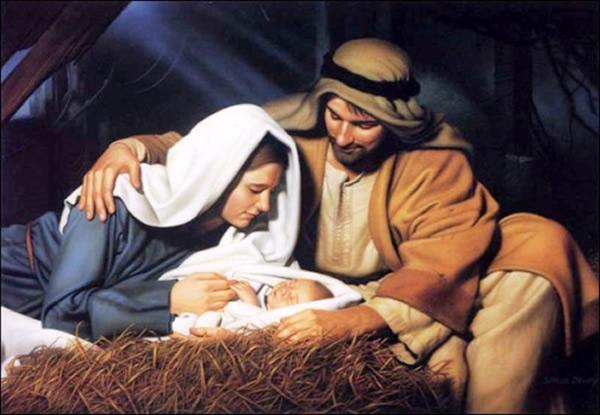 |
When the Lord commanded His people to flee Babylon in the last days (Rev. 18:4), exactly what did He mean?
The ancient city of Babylon was a world power center in three areas: (1) it was an immenser military power which conquered most of the world at its peak, (2) it was a huge commercial center, the hub of all commerce, and (3) it was the spiritual center of Pagan religion and demon worship. The words "Mystery Babylon" written on the head of the wicked woman riding the beast in Revelation (Rev. 17:5) apparently refer to all three of these.
Perhaps knowing that could give us a clue as to how to celebrate Christmas as a time of actually remembering and celebrating the birth of our Savior Jesus Christ. If it is the commercial part of Christmas that we hate, then knowing that commercialism is one of the principal meanings of the symbolic word "Babylon", then perhaps fleeing Babylon could be done by avoiding all of the commercial side of it.
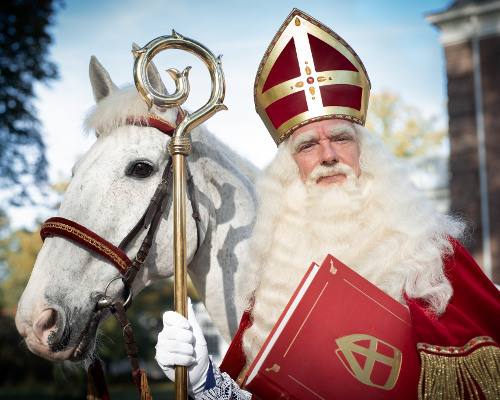 |
The opinions of pastors about celebrating Christmas differ greatly. One pastor on YouTube said not to engage in the Pagan traditions of a Christmas tree and holly wreaths, but it is fine to celebrate the birth of the Christ child with a nativity and appropriate Christmas carols. Another said exactly the opposite! He was not concerned with the origin of the traditions having been Pagan, but instead referred to Christmas as a "civil" holiday. He emphasized that the Bible does not refer to Christmas as a holy day, nor instruct us to celebrate the birth of Christ. Thus, he said to enjoy the Christmas tree, the yule log, and the mistletoe, but do not try to make it a holy day by setting up a nativity scene or associating it with Christ at all!
There is obviously a middle position between the extreme positions of those two pastors. That is that there is no problem at all with celebrating a holiday which has origins that mean nothing to you, but which helps you remember and celebrate the birth of Christ. That seems to be to position of all Christian churches which have a Christmas tree, a Christmas pageant about the birth of Christ, and Santa Claus giving gifts to children.
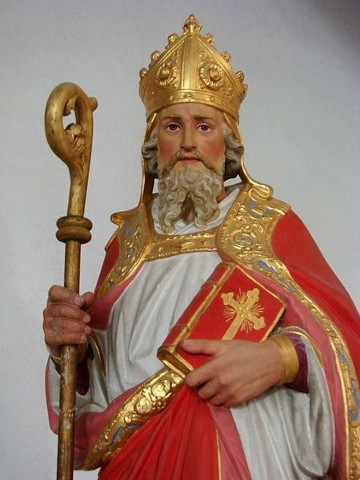 |
Now let's look a little deeper into these Pagan traditions and also what the Lord has said concerning them. Both of these pastors quoted the same verses from the Bible in their presentations:
Hear ye the word which the Lord speaketh unto you, O house of Israel: Thus saith the Lord, Learn not the way of the heathen ... For the customs of the people are vain: for one cutteth a tree out of the forest, the work of the hands of the workman, with the axe. They deck it with silver and with gold; they fasten it with nails and with hammers, that it move not. -- Jer. 10:1-4
 |
Thus, what the Lord referred to looks like a Christmas tree, and even smells like a Christmas tree (evergreen)! Sure enough, that was what we would call a Christmas tree, way back in Jeremiah's day! But the real problem was that the tree was worshiped as an idol!!
The second pastor could be a great advisor for the semi-infinite number of Christmas movies produced by Hallmark. I have watched many of them and listened carefully to see if the name Jesus Christ was ever mentioned. They seem to have a perfect record for keeping it a secular holiday of fun family traditions with lessons of love throughout. The only time I heard any reference to Christ was in an occasional Christmas carol. So that second pastor would praise them for not trying to Christianize a Pagan holiday. Judging from comments, many Christian viewers are disappointed in that approach. In fact, all of the wonderful people on the those Christmas shows could be Pagan, because Jesus Christ is never mentioned. When the persecution of Christians comes to America during the reign of the Antichrist, will there be enough evidence to convict you?
Is it important that both Christmas and Saturnalia/Yule used to fall on the same day? The winter solstice used to occur on December 25th, which was the date of the Roman Saturnalia and the Celtic Yule. Currently the Pagan celebration occurs near December 21th, the current solstice date. The usual story is that Christians did not know the birth date of the Savior, so they purposely chose the birthday of Sol Invictus (Saturnalia) for their Christmas day to get a ready-made party and attendees. Is that really true?
I've never seen that theory well documented, such as from the minutes of the Nicene Council. I have seen the explanation by Augustine of the date. One early tradition was that Christ was born on March 25th (the equinox back then) and another said 12 days later on April 6th. The English held that March 25 was correct until 1751. Before that year, the first day of each year on the "Old Style" Calendar was March 25th in honor of the Savior's birth, whereas for Catholic Europe, the first day of the year was January 1st as on the Roman Calendar.[4] Augustine had also accepted the March 25th date until he decided that life begins at conception, so Christ must have been conceived on March 25th. If so, the He would have been born nine months later on December 25th! The Eastern Orthodox partially accepted this reasoning, but still liked the birth 12 days later, so they celebrated the birth on January 6th. Eventually, the two churches decided to agree, so now both churches celebrate Christmas on December 25th and Three Kings Day (Ephiphany) on January 6th. That is because the Bible is sometimes understood to say that the magi came two years after His birth (Matt. 2:16). The English "Twelve Days of Christmas" refer to the twelve days between Christmas and Three Kings Day[5], which really originates in the difference between the birth dates of March 25th and April 6th!
All of this information might be considered only historically interesting or extremely relevant today, depending on the reader. There are certainly many options open on just how to deal with Christmas!
Now let us consider Easter, which is the most important holy day of the year for Christians. Is it really a Pagan holy day which predates the Christian Easter? No, it is not, all of the posts on FaceBook notwithstanding! But is it not named after the ancient goddess of fertility, Ishtar? Let's consider this question in more depth because this holy day is actually the opposite case of Halloween/Samhain or Christmas/Yule. In those cases, Christians adopted a Pagan holiday and attempted to "Christianize" it, in an attempt to please all of the people. That is not at all the case with Easter!
The corresponding Pagan holy day of Ostara (or Eostar), occurs at the spring equinox (20-22 March), not on the Sunday after the spring full moon. So the two holy days are not celebrated on the same day at all!
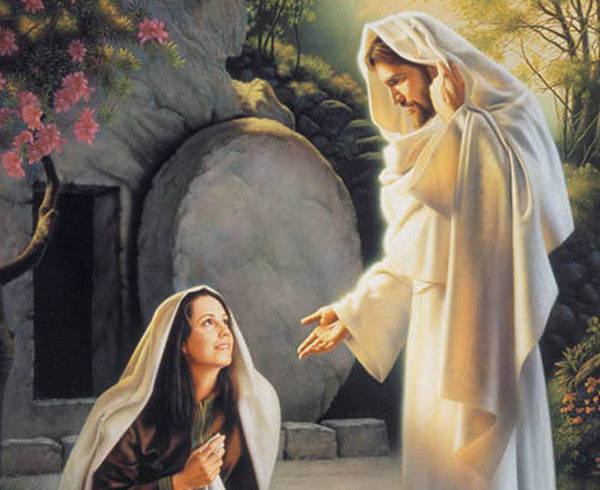 |
When it came time at the Council of Nicea in AD 325 to determine when the Resurrection was to be celebrated, it was decided to try to mimic the Hebrew Calendar at the time of the actual Resurrection and also ensure that Easter never fell on Passover. Passover was at the full moon on or after the spring equinox, and the equinox was then on March 21st, so our modern formula for calculating that holy date is that it is the first Sunday after the full moon on or after March 21st. An equation is used to calculate the "Paschal" (meaning Easter but derived from "Passover") moon. That is why Easter varies between the dates of March 22nd to April 25th.
The point here is that Easter and the day of Ishtar are not the same day. Easter is always on a Sunday usually about two weeks after Ostara.
Why do the two separate holidays have such similar names? The Pagan name Ostara derives from the Old High German form of the Old English goddess Eostre.[7] Many say that the name "Easter" derives from the old Babylonian "Ishtar", which indeed is a homonym, sounding nearly the same. Others say it is not related to Ishtar at all.[8] The Assyrian goddess of fertility Ishtar was another name for Ashtoreth, the goddess whom Solomon worshiped, leading to his downfall (1 Kings. 11:5). To me the distinction between Ishtar and Eostre is not a point worth quibbling over because some of the scattered tribes of Israel migrated from Assyria (land of worshiping Ishtar) to Great Britain (land of worshiping Eostre), where they were called the Celts and the later arrivals were called Anglo-Saxons. To me there is no doubt that the name Easter does indeed ultimately derive from Ishtar.
So how did the celebration of the Resurrection of Christ become confused with the Pagan celebration of the spring equinox? The answer appears again to be a simple transferring of cultural and religious traditions. When the Pagan Anglo-Saxons of the British Isles were converted to Christianity, they brought with them the name of their spring festival Eostre. But did not the Roman Catholic Church already have name for the holy day? Apparently in all of the European languages it was called a name directly coming from "Passover" and at some point it was decided to come up with a new name to distinguish it from the Hebrew holy day. Eostre (from Ishtar) won out and the day is now called "Easter" by the Roman Catholic Church.
So what about the Easter Bunny and the Easter Eggs? They are definitely associated with the Pagan Ostara celebration,[9] but apparently do not trace back as far as the goddess Ishtar.[10]
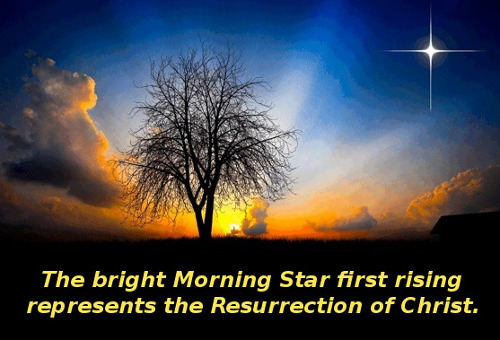 |
Will this knowledge change anything in the reader's celebration of Easter? Many people have been told that "Easter" is a Pagan holiday so Christians should not celebrate it. It is hoped that this article may convince anyone who had stopped celebrating Easter because it is "Pagan" to ignore that name and rejoice in celebrating the Resurrection of Jesus Christ!
For me personally, as I answered the 5th proposed question, which concerned names, in the list in Section 1, my answer changed two of my practices. Names are indeed very important to guide how one thinks about the subject of the name. First, I intend henceforth to refer to Halloween as Samhain as a reminder that it is an entirely Pagan holiday. Second, to me the name "Easter" does indeed remind me of its Pagan origin, which is distracting. Our Roman calendar has Pagan names for days and months, so another such name is not a deal breaker. I do not, however, wish to perpetuate what appears to be a mistake of the past, namely that the holy day celebrating the Resurrection did not receive a distinct name at the Nicene Council to distinguish it from Passover, resulting in a Pagan name being later adopted later to fill in that gap. There is no reason for the Pagan name to be perpetuated in my work on the Hebrew, Enoch, Star, and Toltec Calendars as has been done until now.[11]
Henceforth in my work, the day celebrating the Resurrection of Jesus Christ on those calendars will be called "Dawn Star". Jesus identified himself as the "bright and morning star" (Rev. 22:16), referring to the planet Venus as the Morning Star at its bright rising. The Resurrection of Jesus Christ occurred on the very day of the first rising of the Morning Star on the Venus Calendar, which represented the day of its "resurrection" to Native Americans after its "death" as the Evening Star. They called it the "Dawn Star". Thus, the name "Dawn Star" brings to mind rising, the return of light, the resurrection, and the eastern horizon. There can also be mental links from "Easter" to "East Star" to "Dawn Star".
Even though they all have Pagan roots, the popular holidays of Halloween, Christmas, and Easter differ greatly in just how Pagan they are. Halloween is virtually entirely Pagan, Christmas is about half and half, and Easter is almost entirely Christian.
This article is in response to those who teach that none of those holidays should be celebrated by Christians because of the Pagan ties. The first section of the article provides an overview of all three. Biblical passages are reviewed which are often used to imply that Christians should never participate in anything with any Pagan overtones, but it was shown that in every case the real problem was that the Pagan ritual required breaking commandments. Questions were proposed for Christians to consider when deciding if and how to celebrate those holidays. The most important question is whether their celebration would break any of the Ten Commandments or the Lord's commandments to Christians (Sermon on the Mount).
Then some Pagan traditions were reviewed of each of those holidays. While it is interesting to learn that Christmas trees date back to having been worshiped in the days of Abraham, it was emphasized that the evil part of that tradition was the idol worshiping, not the tree itself.
The importance of names was also emphasized because words suggest the meanings of the celebration. Two of those holidays are misnamed by Christians. Halloween is not a holy day even though the name "Hallowed" says that it is, so it was suggested simply to call it Samhain, the Pagan name. Similarly the name "Easter", being of a Pagan goddess, may not appropriate to use for the celebration of the Resurrection of Christ. It was announced that in my work, the corresponding days of Resurrection on the Hebrew, Enoch, Star, and Toltec Calendars will henceforth be called "Dawn Star" because the Resurrection occurred at the rising of the bright and Morning Star, representing the Resurrection of Jesus Christ.
1. The "True Love" is Jesus Christ as it partridge, who will sacrifice its life for its young.
2. The two turtle doves are Old and New Testaments.
3. The three French hens are faith, hope, and charity.
4. The four calling birds are the four gospels: Matthew, Mark, Luke, and John.
5. The five golden rings are the five books of Moses.
6. The six geese a-laying are the six days of creation.
7. The seven swans a-swimming are the seven-fold gifts of the Spirit: Prophesy, Serving, Teaching, Exhortation, Contribution, Leadership, and Mercy.
8. The eight maids a milking are the eight Beatitudes.
9. The nine ladies dancing were the nine fruits of the Holy Spirit: Charity, Joy, Peace, Patience, Kindness, Mildness, Fidelity, Modesty, and Chastity.
10. The ten lords a-leaping are the Ten Commandments.
11. The eleven pipers piping are the eleven faithful apostles.
12. The twelve drummers drumming are the twelve points of belief in The Apostles' Creed.